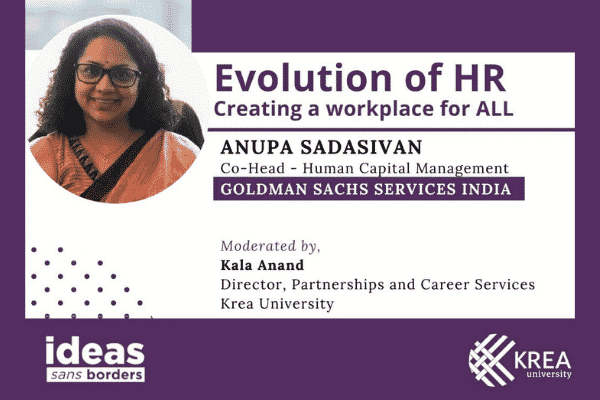In a highly engaging session with the undergraduate cohorts of Krea University, Anupa Sadasivan, Co-head – Human Capital Management, Goldman Sachs Services India shed light on the important role of diversity and inclusion in organisations, the evolving hiring process and the impact that organisations like Goldman Sachs create as they uphold their organizational values.
In an evening filled with conversations, Anupa took the student audience through the evolution of the HR function, reflecting on her own experiences spanning two decades. “The shift in HR – I have experienced – is moving away from process, to people, to culture, to creating the right environment. It is no longer about saying that these are the tasks one needs to deliver but about how you are enabling people to succeed. Even the language of HR has seen a big shift.”
She emphasised on the need to look at team performances rather than a siloed approach and stressed on collaborative and consensus-driven team environments. Speaking to students eager to learn more about the HR function, she clarified how it is not about being a people’s person but about being solution-oriented with nonlinear thinking, understanding the business, leaders, people, operating environment and being a facilitator. She stressed on capabilities and mindset and not just about subject matter expertise.
While encouraging depth in the space of chosen learning she also spoke of inculcating the agility to move and integrate multi-disciplinary approaches and diverse perspectives. Anupa articulated how Goldman Sachs hires people from multiple disciplines because it is diverse perspectives on the table that matters.
Speaking about diversity and inclusion, Anupa pointed out how diversity has always been in the business principles of Goldman Sachs and how its leaders have always maintained that diversity is not optional but what it must be. This involves, but is not limited to novel digital campus drives, hiring of veterans, bringing back women who have opted out of the workforce through internship programmes, and participating in job fairs for LGBTQ+ professionals. She added, “We would have people across disciplines and streams doing jobs that you would not naturally think they would do.”
When asked about the shift to the hybrid work model, Anupa noted that they are still learning and anchoring the decisions with a people first approach because this was something that did not have a playbook and no one was prepared for. On the current shift, she spoke about how it is important to be constantly aware of what is happening so that one can tweak their responses to it and stay relevant. She also spoke about embracing technology through bite-sized technical training programmes and how Goldman Sachs moved away from a ‘should do’ to ‘do on demand’ approach so that training programs were available at convenience.
About the work across their inclusion networks in the gender, disability, veterans, LGBTQ+ and religion and culture focus areas, she stressed on how important it is to be visible and vocal, to engage in dialogue and take the momentum and conversation forward. “When it comes to inclusion, it is of utmost important to demonstrate commitment through actions and talk about it,” she said.
